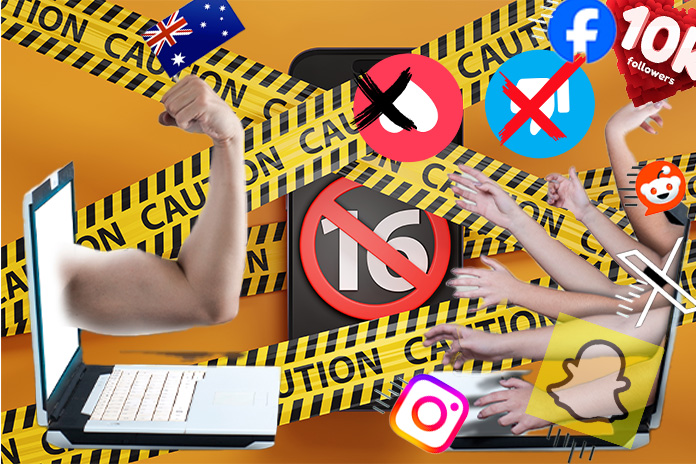
AUSTRALIA has passed the law to ban children under the age of 16 from accessing social media. And other countries are watching to see how they can partially close the lid on this Pandora’s box.
The Australian Senate passed the bill on 28 Nov 2024, following feedback from parents concerned by online harm to their children.
With the new law, social media platforms, including TikTok, Snapchat, Reddit, Instagram, X and Facebook, will face fines of up to A$50 million if they fail to prevent children under the age of 16 from holding accounts.
The platforms have one year to implement appropriate measures before penalties are enforced.
But children and young teens will still be allowed to use other addictive and potentially harmful platforms like YouTube, WhatsApp and gaming services.
Like any shrewd government, the law has conveniently made the platforms responsible for shouldering the fixing work, with heavy punishment for any missteps. But, fair’s fair since the platforms have, since their inception, been out to get data and profits, and will do anything to keep attention on their offerings. But, at what cost?
Other countries are viewing Australia’s bold move to see if they too might want to introduce similar control measures.
STORM-ASIA spoke to a few parents in various countries and a psychologist to get their views on the new legislation and whether they would like to see it implemented globally.

Varian Monteiro, Counselling Therapist with Counselling Perspective, Singapore.
“Personally, I’m not sure how it can be implemented practically and what sort of break-the-dam effect it may have for other rights and laws.
Pros and cons, really. The access to a lot of unhelpful and harmful content gets restricted, so children can learn about certain topics (e.g., birds and bees) from their parents or credible sources instead of social media. Introduction to age inappropriate material can alter development and ways of thinking (e.g., thinking that promiscuity is okay). However, some parents don’t provide such education.
One positive impact could be better attention spans, given that most social media feeds content in quick, bite sizes.
A major concern is that many children use these platforms to socialise and connect with friends. Are they cutting off an important social element for children and, if so, what will replace it? Will parents or caregivers step in to interact with children more? Socialising is developmentally beneficial and can provide lessons on what are appropriate/acceptable ways of interacting.”

Xiang Yi, Director at a media agency and mother of a young son, Singapore
“I’m not sure who they are trying to appeal to or appease with this social media ban. There’re also a lot of positive things which happen on social media.
I can’t really see how they’ll enforce it or keep the kids away!
Reaching the Generation Alpha (children born in the early 2010s) will pose a problem for sure for the advertising industry. YouTube, influencers and in-game ads will be alternative avenues to be considered should this ban be adopted on a global scale.”

Parvathi Nayar, artist and mother of a 16-year-old daughter, Chennai, India
“I think it’s a great move.
It reflects a growing awareness of the risks these platforms pose to young people, akin to age ratings for films. This measure equips parents and schools with a vital tool to protect children from exposure to harmful content and excessive screen time.
If successful, it could encourage a return to more meaningful, ‘old-fashioned’ communication, fostering real connections among friends through genuine interactions rather than curated moments designed for social media. By prioritising mental well-being and authentic relationships, this policy could set a valuable precedent.”

Mike Hagbeck, Entrepreneur, father of two young daughters and a son, Singapore
“From my earliest memories of childhood in Australia to a current holiday watching my half-Singaporean children get wild on the beach with their cousins, outdoor living is an absolutely essential part of growing up healthily in this country.
Apart from the hoped-for mental benefits of this ban, I hope and expect that it will force Australian kids to reconnect with each other and the real world around them.”

Dom Meli, Principal, People At Their Best, father of two boys, Sydney, Australia
“We regulate all sorts of areas where we believe there is evidence that young people need protection — smoking, alcohol, driving, sex and labour, to name a few — and where the evidence supports that there is a risk of exploitation and harm. My only surprise with this legislation is that it has taken so long in the face of overwhelming evidence that social media causes harm and that the business model of these businesses is based on people being commodified and monetised.
I really can’t see any social good or upside in letting my two boys be on social media anymore than letting kids smoke.
The epidemic in self-harm and kids suffering all kinds of mental health issues is closely correlated with the rise in these platforms.”

Dean Loh, WebSifu, Kaia Pte Ltd, father of two teenage boys, Singapore
“For years, there have been laws restricting kids from buying cigarettes or liquor, yet we still see minors getting their hands on them effortlessly. Porn sites require users to verify they’re above 21, but has that stopped teens from accessing them?
Laws struggle to stop adults from doing what they want — good luck stopping teens from being part of the Internet.
There’s a joke about how to get people to do something:
1. Force them to.
2. Pay them to.
3. Tell them not to.
As a father of two teenage boys, my approach to parenting is to take the time to explain what they need to know and let them decide what’s right or wrong, instead of enforcing strict controls. They understand the consequences of their choices, and, so far, they’ve done just fine.
I’m not claiming my method deserves a ‘Parent of the Year’ award, but it works for us. When I was a teen, I hated being told what to do and made plenty of mistakes. But those mistakes taught me valuable lessons. Now, as a parent, I believe in giving my kids the same opportunity to learn and grow on their own terms.”

Dr Jean-Louis Papineau, orthopaedic surgeon, father of two children, Perth, Australia
“Technology and social media have a lot of positives, but there is also a very real risk of significant harm that can be delivered. The risk of predatory online behaviour and cyber bullying can have devastating and tragic consequences.
Our school year group had already agreed to keep the kids ‘smart phone free’ until high school before this, so I think this law is a huge help. Our two young kids have an iPad but only use it when we are with them.
There really isn’t a real ‘need’ for a child to access social media. I understand the argument of exposing all Australians to free and unfiltered media opinions, however this must also be balanced with the risk of spreading disinformation to a vulnerable young mind. It is unrealistic to think this will completely and totally stop kids from accessing any platform. There will always be families that decide to cheat the system; this even occurs with parents allowing underage children to consume alcohol.
But the new law means that it is now ‘normal’ for a child to not have access to social media.
You must actively make a decision to break the law and lie to allow a child to use it.”

Cherie Lim-Tseng, Fintech COO and parent of three sons, Singapore
“While the spirit of the legislation, aimed at protecting young people, is understandable, it feels rushed and, on a level, feels like it hawks off responsibility on external entities rather than fostering accountability within families and communities.”

Dirk van Motman, Founder/CEO UN-ventures Pte Ltd, father of a 11-year-old daughter, Singapore
“Let’s not kid ourselves….
It’s easy to look at the social media youth debate in an ‘American football’ way — one party versus the other. But all stakeholders have a role to play.
The social media platforms, authorities, politics (not the same), science and yes…parents! Some might say even the kids.
As both the father of an 11-year-old daughter and an ex global exec of one of the biggest worldwide advertising firms — I like to think that an important step is to think beyond the device and digital. Because when we grew up our parents also curated what we had access to in terms of reading and viewing materials. Of course it was much easier those days as there was less proliferation of channels and ease of access — it was about who was in charge of the remote control and subscriptions.
Advertisers and media those days surely were trying to lure the kids eyes balls, too.
But the real issue remains the same: battling the tensions between
1. How would you like your kids to grow up, what kind of reading and viewing should they be exposed to and what active role do you take as a parent in this;
2. Which guard rails will society put onto media? Yes they will try to self police but it’s always the battle between revenues and social responsibility which is where advertisers and authorities come in.
I put my money on number 1 as that’s what you can control, but you need to be willing to go the distance.
Have a view on parenting, look into apps that help you with that and how to program them, choose education that supports those views, influence society/politics accordingly and communicate/work with your kids about rules and boundaries in a digitally led world. We like to give them a watch/phone to see where they are but not what they read/view.
Initially, I adopted a light touch (explicit content blocking and certain sites) with my daughter, but following some disturbing content and spending considerably on my card without my knowledge, I realised she was getting addicted to a game. We sat down and chose an app that would help her navigate a digital world with my guidance.
We settled on Kidslox, an app that, for us, strikes a good balance between monitoring, curating/controlling and ultimately guiding her as she explored the digital world.
Oh and we have an agreed rule: no Social Media before 14 years old and she doesn’t have any on the device. I get grief for that from time to time but we talk and I explain. No amount of her peer pressure is going to have me budge from that and she knows it.
So, when Australia introduced the ban on social media accounts, I felt really good to have a stake in the ground on this, even though I was a little suspicious about the role of the traditional media in this.
But it’s just social media, there’s much more to be done — games, education, etc. Let’s not kid ourselves, it’s all there to get you hooked (you wouldn’t let your kids go to a physical game parlour or a casino every day right?) and it all comes down to us — the parents.”

Manoj Chaman Lal, businessman and father of three young children, Singapore
“Although it can be seen as being a bit harsh, I support the ban, and my concerns are definitely the same as most parents.
I have 3 young kids, aged 10, 7 and 4. I’m concerned about the negative impact of social media on their mental health in the long run. I have seen it in some children, and it’s really tough on both kids and parents. Common issues like anxiety, depression and self-esteem are often linked to these online interactions.
The other concern is their safety, with online predators, cyberbullying, and exposure to inappropriate content.
So, yes better to ban them, or have very, very strict controls.”




















